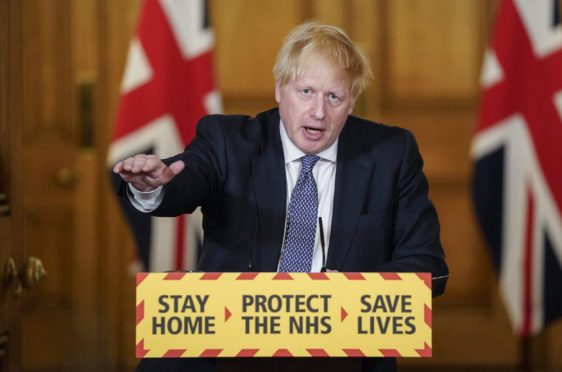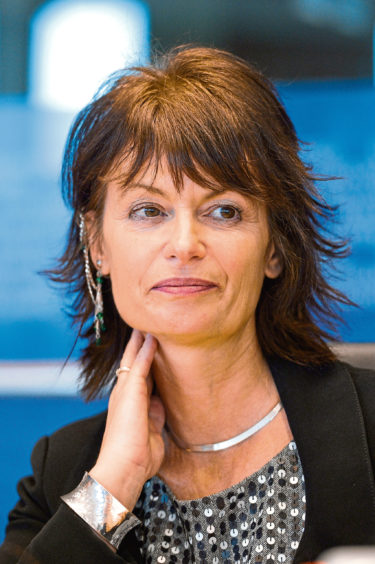
One of Scotland’s leading scientists believes Britain was far too slow to react after coronavirus hit Europe, losing vital time to prepare for the onslaught ahead.
Professor Dame Anne Glover spoke out amid mounting criticism of how the UK responded to the threat of Covid-19, after the country’s death toll became the highest in Europe last week.
The molecular biologist, a former chief scientific adviser to the European Commission, said the UK Government failed to act quickly enough to contain and then prevent the spread of the disease and, specifically, failed to take the opportunity to build a strategy for testing and contact tracing.
Other expert observers have pointed to a critical period in the middle of March when the Prime Minister suspended efforts to contain the spread of Covid-19 through testing before being forced to impose a full lockdown 11 days later.
The Scottish Government was involved in the decision-making as part of a four-nation approach to the crisis and has adopted the same policies as Westminster.
Professor Glover, president of the Royal Society of Edinburgh, Scotland’s national academy of science, said: “It is almost an embarrassment to look and see how badly we have done in the UK, and it’s not because people were lazy or uncaring.
“It is because the UK Government was very badly prepared. The main focus in the UK was probably understanding that our NHS and other social services had been steadily undermined over the past decade with little investment.
“It was quickly realised our health service would probably be unable to cope with a very small number of intensive care unit beds per head of population.
“There will be inquiries into what we did and how we reacted in the UK, but you only have to look at the current figures to see how badly we have done on initial testing.
“Although we’ve tried to ramp that up, it’s still nowhere near what we need to effectively test all those who need testing and then follow that up with tracing and the isolating.
“It’s a very clear mantra of what to do when you’re faced with an unknown infectious disease. You need to test, you need to trace and you need to isolate. And we were too slow. Just way too slow.”
Prof Glover also criticised the UK Government for attempting to hide the identities of members of the Scientific Advisory Group for Emergencies (SAGE) and delay publication of its advice that has shaped the country’s response to coronavirus.
She said: “I think the public deserves to know the membership of the group, but it also means much wider voices who are familiar with the science and have potentially valuable information or commentary can feed it in to the people who are making recommendations to government.”
The academic is now leading an influential Royal Society of Edinburgh’s Futures Commission examining how society will change, post-C19, and believes the public should play a key role in creating a fairer and more inclusive society. She says a basic citizen’s income, a four-day week and higher taxation for the wealthy could all be considered.
But she urged people to be patient while the country remains in lockdown and a vaccine for the disease could be a year away.
She said: “At the moment governments are focused on the crisis management part of the pandemic, and we feel there is a great opportunity to bring some of the best minds in Scotland to bear on reconstructing a better future for all of us after this, almost to take advantage of this unfortunate crisis.
“We have an opportunity to look at how we would like society to be structured. Let’s think about whether we should have a universal wage for all citizens to engage them in being part of society. Do we all need to work a five-day week?
“Is there an option to look at a four-day week because unemployment will inevitably be high after this crisis? Can we share employment around a bit more equitably? There are lots of different things to think about.”
Prof Glover said the commission wanted to hear from anyone about how to transform the country.
She said: “It won’t be restricted to the usual suspects. We’re asking society at large. So whoever you are, if you have an idea of how you would like to see the worlds of work, leisure, social care provision or education, if you have a view, you can feed that in.”
Prof Glover, Scotland’s first chief scientific adviser, warned that a vaccine for the coronavirus could be a year away, and that it could be even longer before it is rolled out to everyone.
She said: “I hope there are some good engineers getting involved in this. We have a global population of almost eight billion people. How do you manufacture that much vaccine and how do you administer it?
“First to get the vaccine would be those who are most at risk, for example all our key workers, carers, utility workers who go into people’s homes. Then people with underlying health problems that put them at more at risk of suffering severe consequences if they were infected with coronavirus.
“At the end of the queue would be people like you or I, with no underlying health problems. As part of the values that we want to celebrate in our reinvented society, I think it is right that we would probably be at the end of the queue.”
Prof Glover urged the public to show patience and to abide by lockdown restrictions until a vaccine does become available.She said: “I don’t think we are able to contemplate getting back to something we understood as normal before this until we have a vaccine. We just have to have patience. It won’t be forever.
“Scotland has always been creative and innovative, and I think we can rely on society in Scotland to come up with clever ideas on how to be able to maintain social interaction.
“The consequence of not observing the restrictions is that people die. People shouldn’t have to die just because we want to go out and have a few drinks, have something to eat or go to a party or a concert.”
Last week, scientists warned that if the country crashed out of the European Union without securing a trade deal by the end of the year, Britain could lose access to billions of pounds from the Horizon Europe research funding scheme.
Prof Glover, who was chief scientific adviser to the European Commission from 2012 to 2014, said: “Historically, we have done very well in terms of securing funding, as well as being able to attract the best in the world to come and work here. So I hope that we get a good deal that will allow us to collaborate in the way that we have always done.
“Science is a sharing of ideas and is a truly global language. It will be challenging if we start putting up barriers and saying we are going it alone.”
Prof Glover, currently professor at Strathclyde Institute of Pharmacy and Biomedical Sciences, also urged support for universities, some of which have already warned they could struggle to survive the coronavirus crisis unless they receive an injection of funding.
She said: “I know that many people regard them as elitist institutions. But universities are the fundamental platform our economies are built on. They produce highly skilled people who will deliver innovation. As we come out of this crisis many people will need support, but universities are the fundamental building block for the future.
“We will need not just the trained people that come out of universities, but we will also need the thinking and skills and knowledge generated by the researchers at universities. They are vital parts of the economy.”

Enjoy the convenience of having The Sunday Post delivered as a digital ePaper straight to your smartphone, tablet or computer.
Subscribe for only £5.49 a month and enjoy all the benefits of the printed paper as a digital replica.
Subscribe